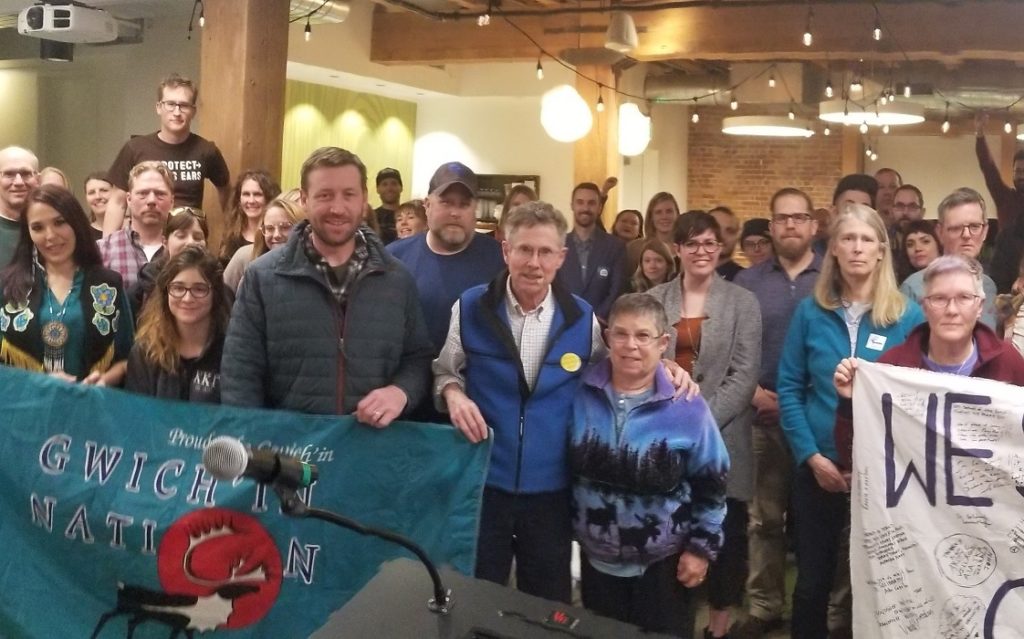Communities Come Together To Stand With The Gwich’in

On the evening of March 5, nearly two hundred people gathered in a ballroom on the campus of the University of New Mexico to lend their voice to the overwhelming call for the Bureau of Land Management (BLM) to reject plans to drill in the Arctic National Wildlife Refuge and instead, restore protection for the coastal plain.
Before we go further, lets quickly look at how we found ourselves in Albuquerque in the first place.
BLM released its draft environmental impact statement (DEIS) for drilling on the Arctic Refuge coastal plain on December 28, 2018 and was followed by more than three weeks of government shut down. In February, BLM announced it would be holding public hearings in six locations throughout Alaska and in Washington, D.C., and while we requested additional public meetings be held across the country to allow for adequate and robust public engagement, our request was denied. Alaska Wilderness League and our partners decided that we would hold our own community hearings in Albuquerque and Denver.
Three weeks later, the ballroom in Albuquerque quieted as attendees heard first hand from Gwich’in leaders the devastating impacts oil and gas development will have on their culture. They also heard from local indigenous leaders who connected the efforts to stop development in places like Chaco Canyon as an extension of the efforts to protect the Arctic Refuge. They heard statements of support from New Mexico’s congressional representatives via their staff in attendance. And then they heard from each other.
Gwich’in Steering Committee Executive Director Bernadette Demientieff speaks to nearly 200 individuals gathered at a citizens’ hearing in Albuquerque, NM. (Alaska Wilderness League)
For more than an hour and a half, one individual after another stepped up to the microphone and shared why they believe the Arctic Refuge should be protected. These included individuals who work in Alaska and have spent time studying the health effects of oil and gas development in villages across the state. It also included people who were directly impacted by resource extraction at Standing Rock and in the Marcellus Shale deposit. Some individuals spoke up having experienced the Arctic Refuge firsthand, while others may never go but believe this refuge for Arctic wildlife should remain wild.
Staff representing members of New Mexico’s congressional delegation speak to the importance of protecting the Arctic Refuge coastal plain. (Alaska Wilderness League)
Bernadette Demientieff of the Gwich’in Steering Committee with Joshua Sanchez, representing Senator Tom Udall (D-NM). (Alaska Wilderness League)
Two days after Albuquerque we were in Denver, setting up a room to hold our second community hearing. The hearing began with testimony from Bernadette Demientieff, executive director of the Gwich’in Steering Committee, Garett Reppenhagen of Vet Voice Foundation, Len Necefer of Native Outdoor, and Greg Balkin who recently produced a film on the Gwich’in and the Arctic Refuge. Again, staff from Colorado congressional members read statements of support from their bosses back in Washington, D.C., who are working diligently to do what they can for the Gwich’in and the Arctic Refuge. And once again, people took to the microphone to speak up for protection of this important ecosystem.
Court reporters captured the testimony given by participants at both locations and the transcripts were submitted to BLM before the close of the public comment period for the DEIS. At both public hearings, people highlighted issues around environmental justice, human rights, wildlife, climate change and the protection of public lands. It was a reminder that the Arctic Refuge is important for so many different reasons, all of which illustrate why development must not take place.
Arctic Refuge supporters in Denver, Colorado. (Alaska Wilderness League)
Three weeks after the community hearing in Denver I found myself in Washington, D.C., sitting at a legislative hearing for the “Arctic Cultural and Coastal Plain Protection Act,” a bill that will restore protections for this Arctic wilderness. Two witness panels during the hearing, the first comprised of Gwich’in leaders, the second with faith, veteran and science voices, spoke passionately about the need to protect the coastal plain.
From right to left: Ms. Bernadette Demientieff, Executive Director, Gwich’in Steering Committee; Chief Galen Gilbert, Arctic Village Council; Chief Dana Tizya-Tramm, Vuntut Gwitchin First Nation, Yukon, Canada; Chief/Chairman Victor Joseph, Tanana Chiefs Conference; and, Mr. Sam Alexander, Gwich’in Leader, Gwich’in Steering Committee. (Alaska Wilderness League)
Their testimony echoed what I had heard from so many during the community hearings. Congresswoman Diana DeGette (D-CO), whose district covers the Denver area, thanked those on the witness panels who had attended the community hearing in Denver, and submitted the testimonies gathered at the hearing into the formal congressional record.
Representative Diana DeGette of Colorado thanks Bernadette Demientieff for visiting her state at a legislative hearing titled, “The Need to Protect the Arctic National Wildlife Refuge Coastal Plain.”
Our work had come full circle, and it was a powerful moment. We are deeply grateful to Representative Lowenthal, Representative Huffman, Representative DeGette and all their colleagues on the House Natural Resources Committee for allowing the Gwich’in people and Arctic Refuge supporters to finally be given the recognition they deserve.
Advocacy isn’t easy or linear and rarely do you see results quickly. That moment within the halls of Congress — as Representative DeGette praised the voices of citizen advocates in her home state — should serve as a reminder to us all. When you use your voice, when you show up, when you work for something you truly believe in, you are making a difference.





